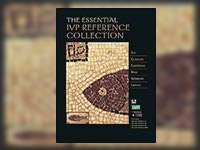The Essential IVP Reference Collection (CD-ROM, 2001)

Christians who desire to be discerning take Bible study seriously. And serious students of Scripture will want to use good reference books as they study the Bible. God raises up teachers among his people who are gifted in probing the meaning of the text, and to ignore their ministry is to scorn the Spirit who is at work in the church. Christianity is not primarily an individualistic affair but is a covenant community in which we need one another’s gifts if we are to grow in grace.
This is not to suggest, of course, that those cut off from gifted teachers will find God’s word closed to them. It is instead an argument against refusing to learn from scholars who love God and his word by not taking advantage of what they would teach us. Using dictionaries to gain insight into the meaning of words and phrases, commentaries to unpack the flow and interpretation of the text, theological works to set it all into the wider perspective of a Christian world view, and atlases and histories to bring geography and culture into sharp relief—all this and more is at our fingertips if we will avail ourselves of it.
On the other hand, a subtle danger lurks in this process. So many resources are so easily available today that it is easy to slide in our study of Scripture—a form of “slothfulness”—so that we don’t actually study the Bible so much as simply allow the resources to tell us what to think. Using resources in Bible study must help us focus on hearing and responding faithfully to the text. Sometimes, however, Bible discussions sound less like believers submitting themselves to the text than a debating society in which members quote their favorite scholar as the final word on each issue. I mention this danger not as an argument against using resources, but as a reminder to use them properly. They are a gracious gift of God, and we should be grateful that we live in a period of history when so many reference works are so readily available.
Over the past few years InterVarsity Press has been publishing a series of helpful reference tools for serious Bible students. Now the entire collection is available on CD-ROM, bundled with a copy of the Logos Bible Study program. The Essential IVP Reference Collection includes:
New Bible Dictionary
New Bible Commentary
New Dictionary of Theology
New Bible Atlas
New Dictionary of Biblical Theology
Dictionary of Jesus & the Gospels
Dictionary of Paul & His Letters
Dictionary of the Later New Testament & Its Developments
Dictionary of New Testament Background
The Bible Background Commentary: Old Testament
The Bible Background Commentary: New Testament
Hard Sayings of the Bible
Dictionary of Biblical Imagery
All thirteen references consume a fair amount of hard drive space. If your computer is limited in this regard, the program can be easily loaded onto your computer while allowing all or some of the books to remain on the CD. Installing the program is simple, except for the minor irritation of being required to first shut off not only any programs that happen to be running (an expected step when installing new software), but the desktop wallpaper and screen saver as well (an unexpected step). The program is easy to run, and like most computerized Bible study programs, the result is simply to have the text and graphics on the screen instead of on the page. The advantages, as you might guess, are ease of use, simplified and speedier searches, and the ability to copy and paste material from the references directly into a word processor.
I am delighted to have resources bundled in The Essential IVP Reference Collection on my computer. The only drawback that I can think of is that the books, all available in hard back, look mighty fine on a bookshelf.

